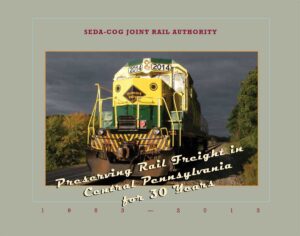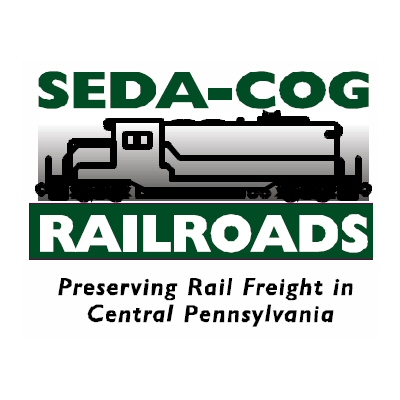 For over 30 years, the SEDA-COG Joint Rail Authority (JRA) has been a self-sustaining engine of economic development for central Pennsylvania.
For over 30 years, the SEDA-COG Joint Rail Authority (JRA) has been a self-sustaining engine of economic development for central Pennsylvania.
The JRA, an eight-county joint authority formed in 1983, has preserved rail service and fostered economic development and job creation throughout the region. The JRA was formed by the forward-looking efforts of its member counties. It has driven local economic growth and creation of good jobs. When the JRA purchased the lines that were being abandoned in 1984 from Conrail, the action saved 3,000 jobs. Now, with six lines that provide rail service to about 85 industries, it has helped local business preserve over 10,000 employees in the region. In 2014, rail traffic topped 26,000 carloads over 200 rail miles; in the 1980s, it was less than 2,000 carloads on 80 miles of line.
Not only has the JRA saved private-sector jobs, but it also has always partnered with private industry for its railroad operations. The JRA owns the real estate, including the tracks, rail yards, bridges and buildings, while the actual rail services are handled by a privately owned railroad operator. The current operator is the North Shore Railroad and its affiliated companies.
The North Shore Railroad purchases locomotives and hires crews to serve the customers. The JRA receives an operating fee from the private operator. From its inception, the JRA’s operations have been supported solely by an operating fee paid from freight revenue. The JRA administrative operations are not – nor have they ever been – subsidized by taxpayer dollars.
The JRA’s public-private partnership has documented phenomenal results in terms of rail infrastructure improvement, economic development and community benefits.
Due to the success of this public-private partnership, the JRA was recognized by the World Bank in a 2009 independent study as a model for public-private partnerships to stimulate rural economic development. Since 2004, the JRA has invested or leveraged $46 million in rail capital projects to further its mission.
Clinton County Commissioner Jeff Snyder said it best: “The JRA was created for a purpose and it has done what it needed to do over the years to support the area businesses. It’s working – don’t change it!”
The JRA has preserved, improved and expanded rail infrastructure through key partnerships and funding projects. In the last five years alone, the JRA has partnered with over 42 private companies and public entities, creating jobs and improving the region’s railroad infrastructure. Some of the best jobs in central Pennsylvania are in companies that are served by railroads. Over the years, the JRA has been fortunate – like many railroads in Pennsylvania – to have received capital grant funds for expansion or substantial improvement of the rail infrastructure.
In addition to economic development, transparency is a hallmark of the JRA’s operations. It is an open and transparent organization as demonstrated by holding public meetings, having minutes available on its website and regularly briefing its member counties on its activities.
In the past two years, the JRA undertook a process to select an operator to continue rail service on its lines after its current agreement expires on June 30, 2017. This effort has been managed through a competitive procurement process, with consultation by expert rail operation consultants. The JRA’s current operator, the North Shore Railroad, is joined by two other proposers being considered in the ongoing process: Carload Express and Northern Plains Railroad.
Throughout this process, the JRA has undertaken extensive due diligence as to how each of the three proposers would run the railroad going forward. Public discussion and consideration of these proposals at JRA meetings have been robust. Objections, however, have been raised by a disappointed fourth proposer which had not been selected to participate in the final process given its ranking relative to the other proposers.
The JRA will continue to operate in an open and community-minded manner in which it has historically conducted its business to further promote its original mission: preserve essential rail freight service; bolster economic development; and support creation of good jobs in the community.
